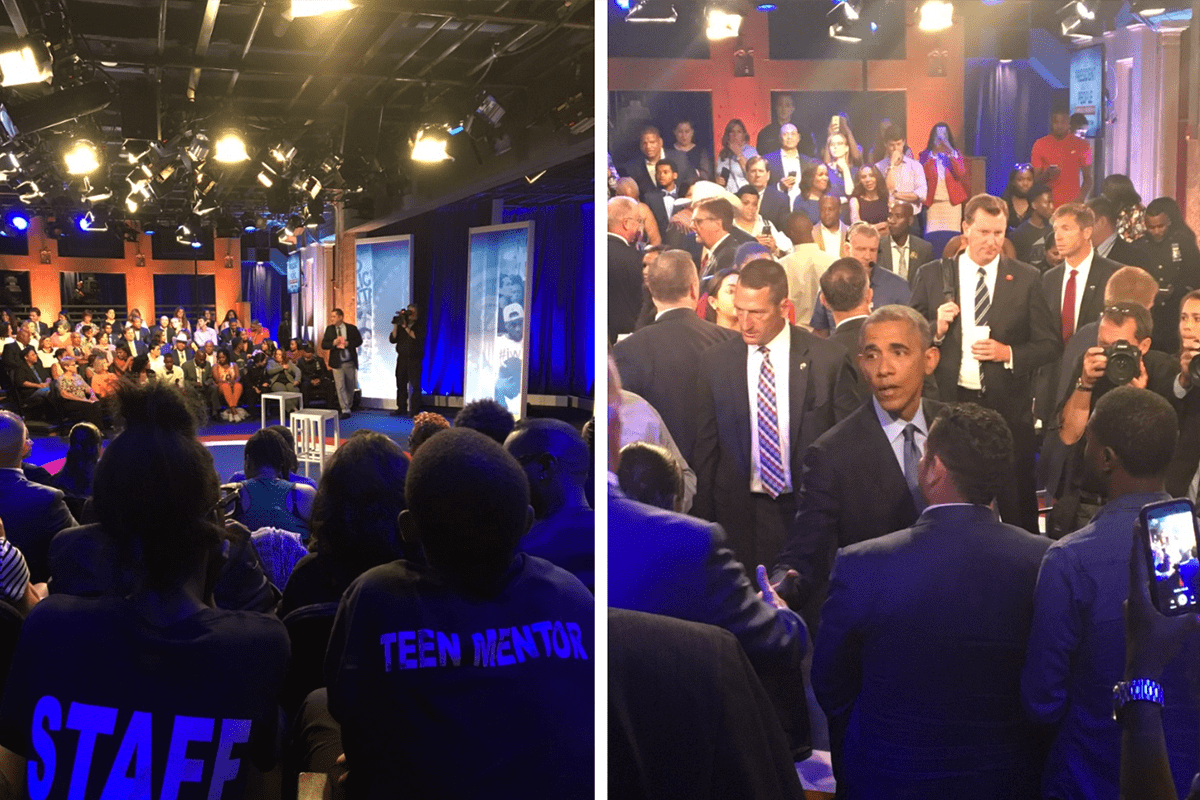Who Claps at a Funeral?
By Adam Zimmerman, July 21, 2016

What it was like to be at President Obama’s town hall on policing, race relations and guns
This piece was originally published in Above the Noise, Burness’ Medium publication. Check it out here.
Last week, ABC aired a town hall with President Obama — billed as The President and the People — answering questions on policing, race relations, and guns. Thanks to a bit of happenstance, my wife and I were a part of the studio audience for this national event. I thought I’d share a few observations and reflections.
It was held at the Studio Theater on 14th and P Streets in Northwest DC. It’s really small; maybe seats 150 people total. Most of the front row and middle seats were assigned to specific people, with the rest of us in the general audience free to choose our own seats. Once everyone sat down, the producers wound up asking some people in the general audience to change seats. Why? Seems they wanted more of a mixed visual captured on camera.
In other words, prior to the start of a “national conversation” on race with the president of the United States, we had apparently segregated ourselves.
There was a palpable tension in the room when the Lieutenant Governor of Texas, Dan Patrick, got one of the first questions and asked Cameron Sterling (Alton Sterling’s son) to stand next to him while Lt. Gov. Patrick criticized the president for not doing enough to support police officers. This, of course, being days after a police officer had just killed Cameron’s father. It was incredibly painful to even watch. This young man had cried on national TV a few days earlier when he lost his dad and now it felt like he was being used as a prop during another nationally televised event with a man who probably wouldn’t otherwise even pretended to give a damn about him. You could sense it from the president, too, which is why the first thing he did before answering the Lt. Gov’s question was to tell Cameron he could sit down. Loud enough to hear but not designed to be disruptive, I heard multiple members of the audience react to the president’s direction to Cameron with two words: “thank you.”
The last question came from John Minster, a white DePaul University student who is an active and vocal supporter of All Lives Matter. As he was asking his question, a woman got up from the front row of the audience and left the room. A moment later, that woman started shouting “Fuck ABC!” from somewhere in the bowels of lobby…loud enough for everyone to hear, for the president to flinch, and for the Secret Service to start making moves. Turns out that the woman was Erica Garner, daughter of Eric Garner from Staten Island, who died in a police chokehold. She was apparently promised the opportunity by ABC to ask the president a question during the program and got furious when Mr. Minster got the last word from the audience. More on that story here.
That incident may have made headlines, but it’s not my Erica Garner takeaway from the afternoon. On my way out of the theater, I noticed her introduce herself to a woman in a purple shirt…purple being the dominant color in the aftermath of the Charleston church shooting. They had a quick handshake and chat on the stairs. I didn’t catch the full exchange, but this is the portion I heard:
“Eric Garner. Staten Island.”
“Clementa Pinckney. Charleston.”
Just two people who wouldn’t have otherwise known each other existed but for the fact that their worlds were similarly shattered. And in just a few words, they formed a connection that only a few people can really fathom.
Being in the room felt a little like being at a funeral. Most of the audience members were/are still in heavy mourning. A producer came out before the taping started to ask us, among other things, not to clap during the event; in retrospect, that seemed like a very silly thing to ask. Who claps at a funeral?
I walked out to find the metro; most others walked out trying to find a way to keep living. What the hell was I even doing there?
I felt a semblance of an answer to that question when Clifton Kinnie from Black Lives Matter asked the president what safety looks like in Black and Brown neighborhoods beyond just the actions of the local police force. The president responded that, in his view, keeping a community safe starts well before any police/citizen interaction. It starts with good schools and decent jobs. It starts with gangs not being the only source of social support and drugs not being the only way to earn money. It starts with parental involvement from day 1.
It occurred to me during his answer that that’s the sort of stuff we at Burness help our clients do. And even if that may not be readily obvious or even something we think about during the everyday course of our work, it’s really at the core of what we do.
It occurred to me in that moment that Burness is an anti-violence organization.
On balance, I didn’t feel right being in that room that day. But each day since, for whatever it’s worth, it’s felt particularly right to be at my desk.